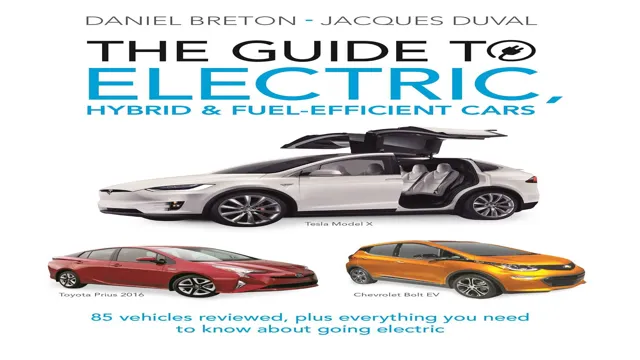Charge Ahead: Your Ultimate Guide to Electric Cars
Electric cars have been a hot topic in the automotive industry for quite some time now, and it’s easy to understand why. They promise various benefits, such as being environmentally friendly, convenient, and potentially cheaper in the long run. However, if you’re new to the electric car world, it can feel a bit overwhelming.
The amount of information available can be daunting, and you might be unsure where to start. Fear not, because in this beginner’s guide, we’ll take a dive into the world of electric cars and provide you with the essential information you need to know. Firstly, what exactly is an electric car? Simply put, an electric car is a vehicle that uses an electric motor powered by a battery pack instead of a traditional combustion engine.
This means that instead of using gasoline or diesel, electric cars run on electricity from an external source, usually a charging station or a home charging station. Plus, unlike conventional cars, electric cars don’t emit harmful exhaust gases; they’re much more eco-friendly. One of the significant differences between electric cars and traditional ones is the range.
How far you can go on a single full charge depends on the car’s battery capacity. So, make sure to consider this factor when selecting a model. Additionally, public charging stations are becoming more common, ensuring that you’re never too far from a recharge.
Another essential consideration is the cost. While the upfront cost of electric cars is generally higher than that of non-electric cars, you could potentially save a significant amount of money on fuel. Electricity is generally a cheaper fuel source than gasoline or diesel, and most electric cars require less maintenance than combustion engine cars.
The future of the car industry is electric, and we’re excited to see where it goes in the years to come. Now that you’ve got a basic understanding of electric cars, we hope that your journey towards going electric won’t be as perplexing. With the many benefits they offer, make sure to consider an electric car for your next purchase.
What is an Electric Car?
Electric cars, also known as electric vehicles (EVs), are vehicles that run on electric motors powered by rechargeable batteries instead of internal combustion engines that run on gasoline, diesel, or other fossil fuels. This means that electric cars produce zero tailpipe emissions, which makes them ideal for reducing air pollution and greenhouse gas emissions. There are two types of electric cars: battery electric vehicles (BEVs) and plug-in hybrid electric vehicles (PHEVs).
BEVs are powered solely by electricity and have a range of between 100 and 300 miles per charge, depending on the model. PHEVs, on the other hand, have both a battery that can be charged by plugging in and a gasoline or diesel engine that extends their range before it needs to be refueled. They can typically travel anywhere from 20 to 50 miles on electricity alone, after which the gasoline or diesel engine takes over.
Overall, electric cars are a great option for drivers who want to reduce their carbon footprint and save money on fuel costs, as they are much more efficient than traditional gasoline-powered vehicles.
Electric Car vs Gasoline Car
Electric car An electric car is a vehicle powered by electricity rather than gasoline. Instead of a traditional internal combustion engine, electric cars are equipped with a battery pack and electric motor. These cars are gaining popularity as people become more environmentally conscious, and it is expected that by 2030, electric cars will make up around 30% of all car sales.
Electric cars usually have a shorter range than gasoline cars, but they are cheaper to run and maintain, and they emit fewer greenhouse gases. They can be charged using a wall socket or a dedicated charging station, and some models can be charged to 80% capacity in as little as 30 minutes. One downside, however, is that electric cars can take longer to charge than gasoline cars take to refuel.

History of Electric Cars
Electric Car An electric car, also known as an EV, is a vehicle that is powered solely by an electric motor or motors. It uses rechargeable batteries to store the necessary energy for movement. Unlike traditional gasoline-powered cars that produce harmful emissions and require frequent maintenance, electric cars can provide a cleaner and quieter alternative.
The history of electric cars dates back to the 1800s when the first electric vehicle was invented. However, it was not until the 1990s that electric cars began to gain popularity, and advancements were made in battery technology. Today, electric cars continue to evolve and are becoming more accessible to consumers looking for a more sustainable and environmentally friendly mode of transportation.
With zero emissions and lower fuel costs, it is no surprise that more and more people are converting to electric cars.
Benefits of Electric Cars
Are you thinking of purchasing an electric car? There are many benefits to making the switch from a traditional gasoline-powered car to an electric one. First and foremost, electric cars produce zero emissions, meaning they are not contributing to air pollution. This is not only better for the environment but also for your health.
Additionally, electric cars are much cheaper to maintain than gasoline cars because they have fewer moving parts and do not require oil changes. Plus, the cost of electricity is significantly less than the cost of gasoline, meaning you will save money on fuel costs. Another benefit is the instant torque of an electric car, providing a faster and smoother driving experience.
And with advancements in technology, the range of electric cars continues to improve, meaning you can travel farther before needing to recharge. So, when considering your next car purchase, consider an electric car for its environmental, economic, and driving benefits.
Environmental Benefits
Electric cars come with a host of benefits, and one of the biggest is their impact on the environment. Since they don’t rely on gasoline or fossil fuels to run, electric cars produce much less pollutants into the atmosphere than traditional vehicles do. This means that driving an electric car can significantly reduce your carbon footprint and contribute to a healthier planet.
But that’s not all – electric cars also help to reduce noise pollution. Unlike gasoline-powered cars, electric vehicles run almost silently, which means that they don’t contribute to the constant hum and buzz of traffic in urban areas. This can have a positive impact on mental health and quality of life for those who live in noisy urban environments.
Overall, electric cars offer a more eco-friendly and sustainable transportation option that can help to reduce our impact on the environment.
Financial Benefits
Electric cars offer numerous financial benefits that make them a wise investment for drivers in the long run. Firstly, the primary financial benefit of electric cars is their low operating costs, which is mainly due to their fuel efficiency. Unlike conventional vehicles that require gas to run, electric cars solely rely on electricity to power their engines, making them much cheaper to operate.
Secondly, electric cars also come with tax incentives and rebates that can significantly lower the initial costs of purchasing the vehicle. Some states also offer additional incentives such as discounted registration fees, reduced toll fees, and free parking for electric cars. Additionally, electric cars require less maintenance due to their simple design, which means fewer trips to the mechanic and lower repair bills.
All of these factors make electric cars a smart financial investment for drivers who want to save money in the long run. So, if you’re in the market for a new car, consider going electric and experience the financial benefits for yourself.
Maintenance Benefits
When considering the benefits of electric cars, one important factor to take into account is maintenance. Electric vehicles require considerably less maintenance compared to gas-powered cars. Traditional vehicles have engines with hundreds of moving parts that need consistent upkeep, while electric cars have far fewer moving parts, resulting in fewer repairs and less upkeep in the long run.
Furthermore, electric cars don’t require oil changes, spark plug replacements, or fluid top-offs. This results in more savings for the car owner over time. Overall, owning an electric car means reduced maintenance costs, fewer repairs, and a longer lifespan for your vehicle.
Types of Electric Cars
When it comes to electric cars, there are several different types to choose from. The first type is a battery electric vehicle (BEV), which is fully powered by an electric motor and a rechargeable battery. BEVs are great for short commutes and city driving, as they typically have a limited range of around 100-300 miles.
The second type is a plug-in hybrid electric vehicle (PHEV), which has both an electric motor and a gasoline engine. PHEVs can run on electricity alone for a limited range, but they also have the option to switch to gasoline if needed, making them more versatile for longer trips. Finally, there are hybrid electric vehicles (HEVs), which use both gasoline and electric power, but the electric component is more like an assistive feature rather than the primary power source.
HEVs are great for those who want better fuel efficiency but aren’t yet fully ready to switch to a fully electric vehicle. No matter which type you choose, switching to electric is a great way to reduce your carbon footprint and help protect our planet. So, if you’re in the market for a new vehicle, be sure to check out the electric car options available to you!
Battery Electric Vehicles (BEV)
When it comes to electric cars, there are three main types to choose from: Battery Electric Vehicles (BEVs), Hybrid Electric Vehicles (HEVs), and Plug-in Hybrid Electric Vehicles (PHEVs). BEVs, sometimes referred to as pure electric cars, run solely on electrical power supplied by a rechargeable battery. This means that they emit zero emissions while driving, making them an excellent choice for those looking for an eco-friendly vehicle.
However, one downside to BEVs is that they have a limited driving range and require lengthy charging times compared to traditional gas-powered cars. But as technology continues to advance, this range is increasing, and charging times are decreasing, making BEVs a more practical choice for everyday drivers. Plus, the cost of owning a BEV is significantly lower than a gas-powered car, as the price of electricity is much cheaper than gasoline.
Overall, if you’re looking for a car that will help you save money and reduce your carbon footprint, a BEV is definitely worth considering.
Plug-in Hybrid Electric Vehicles (PHEV)
One type of electric car that is gaining popularity is the Plug-in Hybrid Electric Vehicle (PHEV). PHEVs are essentially a combination of an electric car and a traditional gasoline car. They have a larger battery than a traditional hybrid car, which allows them to drive solely on electricity for short trips.
However, they also have a gasoline engine that kicks in once the battery depletes, giving drivers the peace of mind that they won’t run out of power on longer trips. This dual-capability makes PHEVs an attractive option for those who want to reduce their carbon footprint but may have concerns about the limited range of a purely electric car. PHEVs also tend to have a slightly higher price tag than traditional gasoline cars or hybrid cars, but the savings on fuel costs over time can make them a smart investment for environmentally-minded individuals.
How to Choose an Electric Car
When considering purchasing an electric car, it’s important to assess your needs, budget and lifestyle before making a decision. There are a variety of electric car options that vary in range, size and price, so it’s important to consider your daily commute and driving habits. If you have a shorter commute or mainly use the car for local errands, a smaller electric car with a shorter range may be more affordable and practical.
However, if you frequently travel long distances or need extra space for passengers or cargo, a larger electric car with a longer range may be more suitable. It’s also important to consider charging options and infrastructure in your area, as charging time and accessibility can vary. Lastly, budget is a major consideration when purchasing an electric car, as they can be more expensive upfront, but may save money on fuel costs in the long run.
With these factors in mind, you can make an informed decision and find the electric car that best fits your needs and lifestyle.
Conclusion
In conclusion, choosing an electric car is more than just a wise environmental choice. It’s a decision that will save you money, provide you with a smooth and quiet ride, and ultimately make you the envy of your gas-guzzling neighbors. So go ahead, make the switch to an electric car and show the world that you’re driving towards a cleaner and brighter future.
“
FAQs
What is an electric car?
An electric car is a vehicle that is powered by an electric motor and battery.
How does an electric car work?
An electric car works by using its battery to power an electric motor which then turns the wheels of the car. The battery can be recharged by plugging the car into an electrical outlet or charging station.
How far can an electric car travel on a single charge?
The range of an electric car can vary depending on the model, but most electric cars can travel between 100 to 300 miles on a single charge.
How much does it cost to charge an electric car?
The cost to charge an electric car will depend on the cost of electricity in your area and the size of the car’s battery. On average, it can cost between $5 to $15 to fully charge an electric car.
Are there any government incentives for purchasing an electric car?
Yes, many governments offer incentives for purchasing an electric car such as tax credits, rebates, and access to carpool lanes. It’s best to check with your local government to see what incentives may be available.



